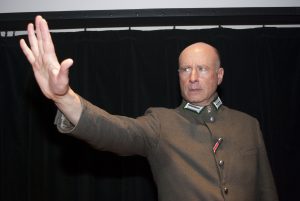Roger Grunwald, the child of a German Holocaust survivor is a performer from San Francisco and the author of The Mitzvah Project. On February 14th, 2017 he presented his solo show at the University of Minnesota. In The Mitzvah Project Grunwald reveals the surprising history of the German men known as “mischlinge” – the derogatory term the Nazis used to characterize those descended from one or two Jewish grandparents – who served in Hitler’s army.
How did you get started integrating theater and community service?
In New York in the late 70s, I became a community activist and helped to build an organization called the New York City Unemployed and Welfare Council. This was at a time when New York City was in receivership. The city was broke and the major banks had taken over. The first programs to be cut were the ones in the poorest communities. One of the things that we learned from these men and women touched by the council’s work was that their kids loved culture but there was no real outlet for them to express this. A number of us who were involved in this community organizing activity came up with the idea of putting on a talent show. For the young people we produced a talent show in a church basement in the Bronx in the early 80s and that was the beginning of the All Stars Project. It is now in six cities around the United States.

What are the origins of the The Mitzvah Project?
Around 2010 I was in a scene study class with Wynn Handman, the founder of the American Place Theater and the former right hand man of Sandy Meisner (one of the founders of the Group Theater). Handman, who has been teaching for 50 years, has been a great developer of actors as solo artists. The likes of which include John Leguizamo and Eric Bogosian. An actress in my class was working on a solo show and it got me thinking. I had been wanting to do something drawing on my family’s history for some time, but I didn’t know exactly what or how. I had the idea to start building a solo show. I started bringing some materials into class and my colleague, Annie McGreevey, became my director and co-writer of The Mitzvah, the short play that is part of The Mitzvah Project.
You mentioned your aunt, a living Holocaust survivor, in your performance as an inspiration of The Mitzvah Project. Can you elaborate on her role?
I realized I needed more material to work with so I went to visit my aunt, my mother’s sister, Annie Bodenheimer. She will be 103 in April. I visited her to learn more and, possibly, develop material, as my mom was deceased at this time. During my interview with her she gave me a book called Hitler’s Jewish Soldiers by Bryan Mark Rigg. I couldn’t put it down. I considered myself fairly well read on the period of the Holocaust but I was unaware of this aspect of the German-Jewish experience. When I finished reading it I realized that it was an important story to be told and, thinking as a theater person, it also had dramatic potential.
What are your goals in performing and sharing The Mitzvah Project?
As the son of a survivor the question I put to myself is, with my mom’s generation dying out, who’s going to continue the teaching of the Holocaust and how? I look at it as a privilege and obligation as her son to leverage my skills as a performing artist to teach this history. I think the theater is a way you can touch people emotionally – something you can’t do in the same way with a talk. That’s one of the skills I have; one of the things we’ve learned about the power of performance.
How do you want The Mitzvah Project to affect its audience?
My hope and my intent is that the play can reach people on two levels: intellectually and emotionally. I’m not just conveying facts and it’s not just drama for the sake of drama. It’s hopefully a connection between the two. Hopefully it is a way of getting a little deeper into people and helping them feel something. If we’re going to change the world, if we’re going to, as a species, transform the world so that the “us and them,” the “we and the other,” isn’t the dominant paradigm. We have to create a new “collective human performance,” if you will. I have no illusions that everyone that comes to the theater is going to be transformed; that the theater as a thing in itself is going to change the world. People are going to change the world.
What have you been working on lately? What’s next for you?
In the last year I’ve been writing what has now become a full-length one-person show called The Obligation. It deals with a lot of moral dilemmas that survivors faced both during and after the war.
For more information on Roger Grunwald, The Mitzvah Project, and his upcoming full length play The Obligation visit his website.
Camille Grey is pursuing a dual degree in Sociology and a Bachelor of Individualized studies in the malleability of human nature at the University of Minnesota.

Comments